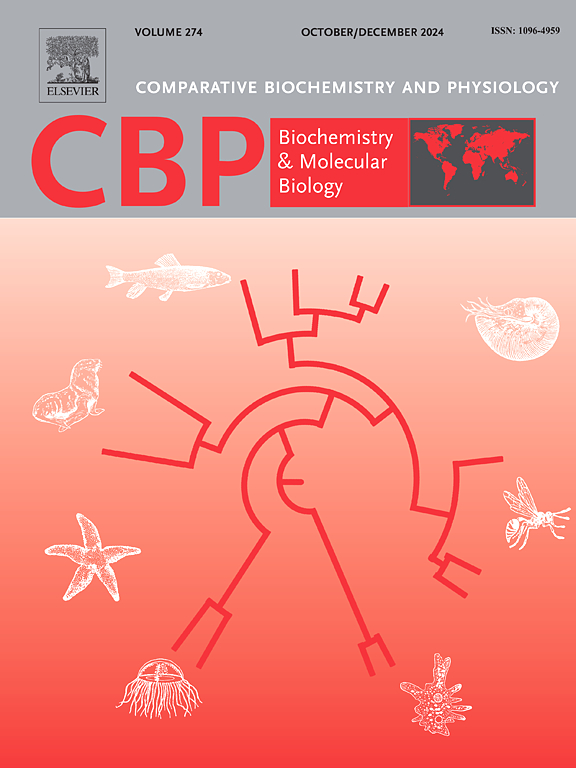Alkalinity exposure induced growth inhibition, intestinal histopathological changes, and down-regulated nutrient transporter expression in Nile Tilapia: The ameliorative role of dietary camel whey protein hydrolysates
IF 1.9
3区 生物学
Q4 BIOCHEMISTRY & MOLECULAR BIOLOGY
Comparative Biochemistry and Physiology B-Biochemistry & Molecular Biology
Pub Date : 2025-01-27
DOI:10.1016/j.cbpb.2025.111074
引用次数: 0
Abstract
Alkaline stress impairs fish productivity and performance and, therefore, is considered one of the major challenges facing aquaculture. In this work, the effects of supplementing diets with camel whey protein hydrolysates (WPH) on growth, digestion, antioxidant capacity, and gene expression were investigated in Nile tilapia (Oreochromis niloticus) under alkaline stress. A total of 160 fish (16.17 ± 0.29 g) were equally assigned into four treatments, with 10 fish in each replicate. The control (C) and WPH groups received the basal diet supplemented with 0 and 75 g/kg WPH, respectively, and were reared in freshwater with an alkalinity of 1.4 mmol NaHCO3/L. The alkaline-exposed (AK) and AK + WPH groups were subjected to alkaline water (alkalinity = 23.8 mmol NaHCO3/L) and fed basal and WPH diet, respectively. Alkaline stress depressed the growth performance, digestive enzyme activity, intestinal Lactobacillus count, intestinal morphometrics, growth hormone level, and antioxidant enzyme activity but enhanced leptin hormone level and malondialdehyde (MDA) concentrations in Nile tilapia. Alkaline stress also downregulated the transcription of key intestinal transporter genes. Dietary supplementation with WPH significantly improved growth, digestive enzyme activity, antioxidant capacity, and the gene expression profile of Nile tilapia under alkaline stress. Based on the current results, it was concluded that WPH diet could mitigate negative effects caused by alkaline stress in Nile tilapia, which might support its application as an effective functional protein replacement candidate in aquaculture.

求助全文
约1分钟内获得全文
求助全文
来源期刊
CiteScore
4.60
自引率
4.50%
发文量
77
审稿时长
22 days
期刊介绍:
Comparative Biochemistry & Physiology (CBP) publishes papers in comparative, environmental and evolutionary physiology.
Part B: Biochemical and Molecular Biology (CBPB), focuses on biochemical physiology, primarily bioenergetics/energy metabolism, cell biology, cellular stress responses, enzymology, intermediary metabolism, macromolecular structure and function, gene regulation, evolutionary genetics. Most studies focus on biochemical or molecular analyses that have clear ramifications for physiological processes.

 求助内容:
求助内容: 应助结果提醒方式:
应助结果提醒方式:


